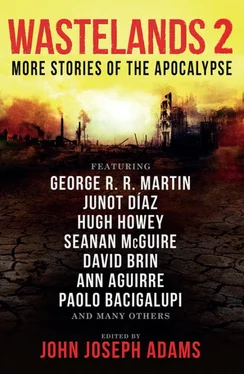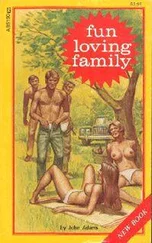That explained the official letters and the lack of junk mail. He hadn’t realized that even a semblance of normality had remained for so long. Of course, a seventeen-year-old militia recruit was unlikely to have seen anything normal. Mob rule and general looting in the main disbursement centers had kept armed authority busy and attrited until the militia finally vanished into the disturbances it had been sent to quell. If men and women elsewhere were behaving more like human beings during those months of horror, Gordon never witnessed it.
The brave story of the postman only served to depress Gordon. This tale of struggle against chaos, by mayors and university professors and postmen, had a “what if” flavor that was too poignant for him to consider for long.
The tailgate opened reluctantly, after some prying. Moving mail sacks aside, he found the letter carrier’s hat, with its tarnished badge, an empty lunchbox, and a valuable pair of sunglasses lying in thick dust atop a wheel well.
A small shovel, intended to help free the jeep from road ruts, would now help to bury the driver.
Finally, just behind the driver’s seat, broken under several heavy sacks, Gordon found a smashed guitar. A large-caliber bullet had snapped its neck. Near it, a large, yellowed plastic bag held a pound of desiccated herbs that gave off a strong, musky odor. Gordon’s recollection hadn’t faded enough to forget the aroma of marijuana.
He had envisioned the postman as a middle-aged, balding, conservative type. Gordon now recreated the image, and made the fellow look more like himself: wiry, bearded, with a perpetual, stunned expression that seemed about to say, “Oh, wow.”
A neohippy perhaps—a member of a subgeneration that had hardly begun to flower before the war snuffed it out and everything else optimistic—a neohippy dying to protect the establishment’s mail. It didn’t surprise Gordon in the slightest. He had had friends in the movement, sincere people, if maybe a little strange.
Gordon retrieved the guitar strings and for the first time that morning felt a little guilty.
The letter carrier hadn’t even been armed! Gordon remembered reading once that the U.S. Mail operated across the lines for three years into the 1860s Civil War. Perhaps this fellow had trusted his countrymen to respect that tradition.
Post-Chaos America had no tradition but survival. In his travels, Gordon had found that some isolated communities welcomed him in the same way minstrels had been kindly received far and wide in medieval days. In others, wild varieties of paranoia reigned. Even in those rare cases where he had found friendliness, where decent people seemed willing to welcome a stranger, Gordon had always, before long, moved on. Always, he found himself beginning to dream again of wheels turning and things flying in the sky.
It was already midmorning. His gleanings here were enough to make the chances of survival better without a confrontation with the bandits. The sooner he was over the pass then, and into a decent watershed, the better off he would be.
Right now, nothing would serve him half so well as a stream, somewhere out of the range of the bandit gang, where he could fish for trout to fill his belly.
One more task, here. He hefted the shovel.
Hungry or not, you owe the guy this much.
He looked around for a shady spot with soft earth to dig in, and a view.
“…They said, ‘Fear not, Macbeth, till Birnam Wood comes to Dunsinane’; and now a wood comes to Dunsinane!
“Arm, arm, arm yourselves! If this is what the witch spoke of—that thing out there—there’ll be no running, or hiding here!”
Gordon clutched his wooden sword, contrived from planking and a bit of tin. He motioned to an invisible aide-de-camp.
“I’m gettin’ weary of the sun, and wish the world were undone.
“Ring the alarum bell! Blow, wind! Come wrack! At least we’ll die with harness on our back!”
Gordon squared his shoulders, flourished his sword, and marched Macbeth offstage to his doom.
Out of the light of the tallow lamps, he swiveled to catch a glimpse of his audience. They had loved his earlier acts. But this bastardized, one-man version of Macbeth might have gone over their heads.
An instant after he exited, though, enthusiastic applause began, led by Mrs. Adele Thompson, the leader of this small community. Adults whistled and stamped their feet. Younger citizens clapped awkwardly, those below twenty years of age watching their elders and slapping their hands awkwardly, as if they were taking part in this strange rite for the first time.
Obviously, they had liked his abbreviated version of the ancient tragedy. Gordon was relieved. To be honest, some parts had been simplified less for brevity than because of his imperfect memory of the original. He had last seen a copy of the play almost a decade ago, and that a half-burned fragment.
Still, the final lines of his soliloquy had been canon. That part about “wind and wrack” he would never forget.
Grinning, Gordon returned to take his bows onstage—a plank-covered garage lift in what had once been the only gas station in the tiny hamlet of Pine View.
Hunger and isolation had driven him to try the hospitality of this mountain village of fenced fields and stout log walls, and the gamble had paid off better than he’d hoped. An exchange of a series of shows for his meals and supplies had tentatively passed by a fair majority of the voting adults, and now the deal seemed settled.
“Bravo! Excellent!” Mrs. Thompson stood in the front row, clapping eagerly. White-haired and bony, but still robust, she turned to encourage the forty-odd others, including small children, to show their appreciation. Gordon did a flourish with one hand, and bowed deeper than before.
Of course his performance had been pure crap. But he was probably the only person within a hundred miles who had once minored in drama. There were “peasants” once again in America, and like his predecessors in the minstrel trade, Gordon had learned to go for the unsubtle in his shows.
Timing his final bow for the moment before the applause began to fade, Gordon hopped off the stage and began removing his slapdash costume. He had set firm limits; there would be no encore. His stock was theater, and he meant to keep them hungry for it until it was time to leave.
“Marvelous. Just wonderful!” Mrs. Thompson told him as he joined the villagers, now gathering at a buffet table along the back wall. The older children formed a circle around him, staring in wonderment.
Pine View was quite prosperous, compared with so many of the starving villages of the plains and mountains. In some places a good part of a generation was nearly missing due to the devastating effects the Three-Year Winter had had on children. But here he saw several teenagers and young adults, and even a few oldsters who must have been past middle age when the Doom fell.
They must have fought to save everybody. That pattern had been rarer, but he had seen it, too, here and there.
Everywhere there were traces of those years. Faces pocked from diseases or etched from weariness and war. Two women and a man were amputees and another looked out of one good eye, the other a cloudy mass of cataracts.
He was used to such things—at least on a superficial level. He nodded gratefully to his host.
“Thank you, Mrs. Thompson. I appreciate kind words from a perceptive critic. I’m glad you liked the show.”
“No, no seriously,” the clan leader insisted, as if Gordon had been trying to be modest. “I haven’t been so delighted in years. The Macbeth part at the end there sent shivers up my spine! I only wish I’d watched it on TV back when I had a chance. I didn’t know it was so good!
Читать дальше












